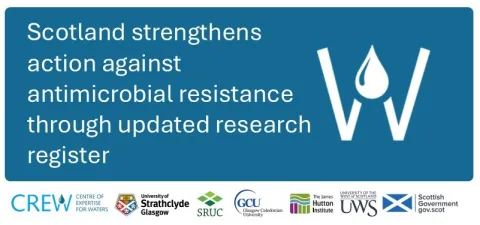
Antimicrobial resistance (AMR) is one of the biggest global health challenges of our time. To support national efforts against this growing threat, the Centre of Expertise for Waters (CREW) funded an updated Scottish One Health AMR Register (SOHAR), which maps AMR research involving Scottish organisations.
The 2025 update which was requested by Scottish Government and led by the University of Strathclyde reveals that Scotland’s research activity has more than tripled since SOHAR’s launch in 2021, reflecting sustained national commitment to tackling AMR across human, animal, and environmental health. Strong progress has been made in developing new treatments and improving how antibiotics are used in healthcare, alongside growing research into how resistance spreads through the environment.
However, the review highlights gaps in several key areas, including animal health, food systems, public engagement, health inequalities, and translating innovation into practical solutions.
To address these, the report recommends keeping SOHAR regularly updated, improving usability and visibility, and encouraging collaboration across sectors. It also calls for targeted investment in underrepresented research areas and for SOHAR to be used to track Scotland’s contribution to the UK’s 2024–2029 AMR National Action Plan.
SOHAR has also launched a new platform hosted by National Services Scotland, making it easier for researchers and policymakers to access and use this valuable national resource.
CREW would like to thank the research team (University of Strathclyde, SRUC, Glasgow Caledonian University, The James Hutton Institute and The University of the West Scotland) and the Project Steering Group (SEPA, Public Health Scotland and Scottish Government) for their dedication and support to the project and in addressing this important issue.